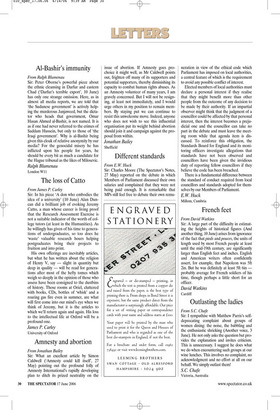neration in view of the ethical code which Parliament has
imposed on local authorities, a central feature of which is the requirement to avoid any possible conflict of interest.
Elected members of local authorities must declare a personal interest if they realise that they might benefit more than other people from the outcome of any decision to be made by their authority. If an impartial observer might think that the judgment of a councillor could be affected by that personal interest, then the interest becomes a prejudicial one and the councillor can take no part in the debate and must leave the meeting room while that agenda item is discussed. To reinforce this obligation, the Standards Board for England and its monitoring officers investigate allegations that standards have not been observed and councillors have been given the invidious duty of reporting fellow councillors if they believe the code has been breached.
There is a fundamental difference between the standard of conduct required from local councillors and standards adopted for themselves by our Members of Parliament.
E.W. Huck
Millom, Cumbria


















































































 Previous page
Previous page